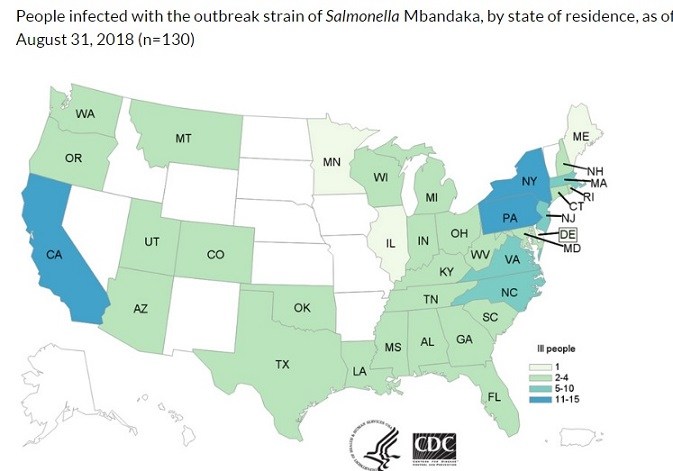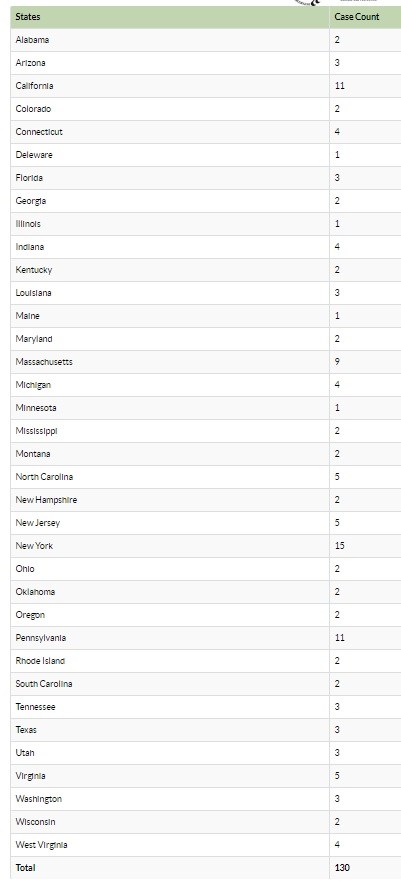Salmonella cases in Eastern Ohio linked to recalled Honey Smacks
The Centers for Disease Control now says that two cases of salmonella in Ohio and 11 in Pennsylvania are included in the 130 reported instances of the outbreak linked to a recall of Kellogs Honey Smacks. A

WASHINGTON - The Centers for Disease Control now says that two cases of salmonella in Ohio and 11 in Pennsylvania are included in the 130 reported instances of the outbreak linked to a recall of Kellogs Honey Smacks.
According to the Ohio Department of Health, the two Ohio cases were reported in Ashtabula and Jefferson Counties, which are both in the eastern part of the state.
The victims were a man and a woman between the ages of 64 and 67. Both were hospitalized.
The FDA, CDC, along with state and local officials are investigating a multi-state outbreak of Salmonella Mbandaka infections linked to Kellogg's Honey Smacks sweetened puffed wheat cereal.
All Kellogg's Honey Smacks cereal was recalled in June 2018. Because the CDC has continued to receive reports of illnesses linked to this cereal, the government is reminding consumers not to eat Honey Smacks cereal.

People are being advised to check their homes and throw away any Honey Smacks cereal.
On May 17, 2018, the FDA learned about a cluster of Salmonella Mbandaka illnesses in several states.
In subsequent weeks, the FDA, CDC, and state partners worked together to identify Kellogg's Honey Smacks cereal as a possible source of the illnesses.
On June 14, 2018, The Kellogg Company voluntarily recalled Honey Smacks cereal.
What Products are Recalled?
The recall notice accounts for all Honey Smacks cereal on the market within the cereal's estimated one-year shelf-life. However, Honey Smacks products with earlier dates could also potentially be contaminated.
Description (Retail)
Honey Smacks 15.3 oz. Best if used by JUN 14, 2018 through JUN 14, 2019
Honey Smacks 23 oz. Best if used by JUN 14, 2018 through JUN 14, 2019
What are the Symptoms of Salmonella Infections?
Most people infected with Salmonella develop diarrhea, fever, and abdominal cramps. The illness usually lasts 4 to 7 days, and most people recover without treatment. Most people infected with Salmonella develop diarrhea, fever, and abdominal cramps 12 to 72 hours after infection.
In some people, diarrhea may be so severe that they need to be hospitalized. In these patients, the Salmonella infection may spread from the intestines to the bloodstream and then to other body sites and can cause death unless the person is treated promptly with antibiotics.

Who is at Risk?
Children are the most likely to get salmonellosis. The rate of diagnosed infections in children less than five years old is higher than the rate in all other people. Children younger than five, the elderly, and those people with weakened immune systems are more likely to have severe infections. It is estimated that approximately 400 persons in the United States die each year with acute salmonellosis.
What Do Restaurants and Retailers Need To Do?
Retailers should not sell and should discard all recalled products.
The recalled products were distributed across the United States including Guam and Saipan, and internationally in Aruba/Curaçao/Saint Maarten (Netherlands Antilles), the Bahamas, Barbados, Tortola (British Virgin Islands), Costa Rica, Guatemala, Haiti, Mexico, Panama, and Tahiti (French Polynesia).
What do Consumers Need To Do?
The FDA is advising consumers to not eat and discard any Kellogg's Honey Smacks cereal. This is regardless of size or “best if used by” dates. If already purchased, consumers should throw it away or return to the place of purchase for a refund. The FDA continues to collect information to determine any additional sources.










